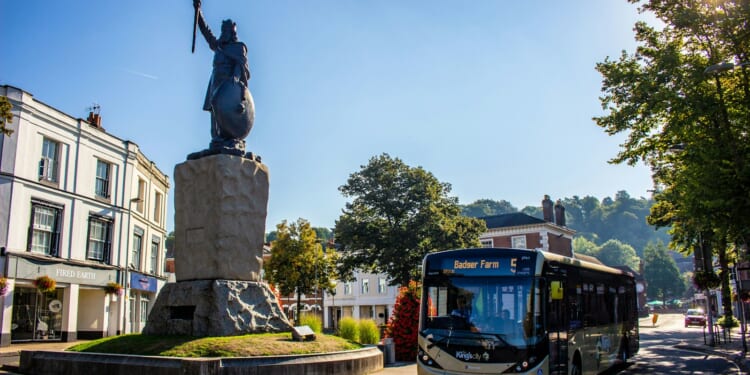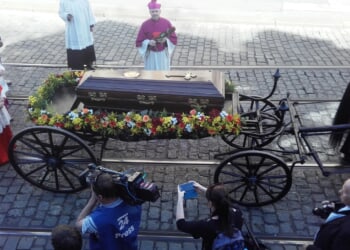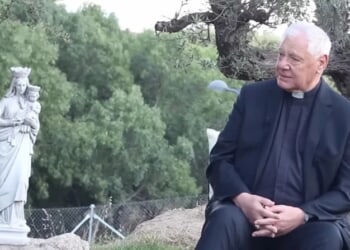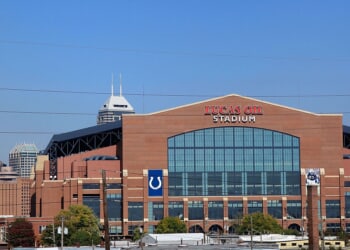Cllr Caroline Horrill is the Leader of the Conservative Group on Winchester City Council.
Winchester City Council represents 130,000 people in a beautiful area of rural Hampshire with the county town of Winchester at the heart of the district.
The city has a huge history. King Alfred’s statue stands over the city representing the time when the City was the national capital. The Office of the Mayor of Winchester is the second oldest mayoralty in England and has its own house, just one of five such properties in the country – Abbey House.
The exact date of the conferment of full mayoral rights is not known since the original charter cannot be traced. When London petitioned the King for a grant of mayoralty in 1190, Winchester was not cited as precedent (as were certain French cities), but by 1200 there was reference to the mayoralty as an existing office. It is, therefore, safe to say that the office dates back to the 1190s.
By tradition, the Mayor of Winchester stands second only to the Lord Mayor of London in precedence of civic heads. The earliest Mayors sometimes held the office for several years in succession, but from the 13th century to the present day, the Mayor has been chosen annually.
As well as being an ancient and honourable office, the mayoralty provides a service to the community both as a non-political Chairman for the Council and as the first citizen of the district. During the twelve-month term of office, several hundred engagements are undertaken throughout the area, encompassing all levels of the community, including major services at the Cathedral, military ceremonies, and freedom marches.
Winchester also has a significant military connection which includes the Army Training Regiment for basic training, and a complex of six military museums at Peninsula Barracks – and a legacy of military history celebrated through these museums and local events, the Royal Green Jackets and the Gurkhas being two of the most prominent links.
The tri-service establishment of Worthy Down is a major MOD training facility and the headquarters for the Defence College of Logistics, Policing and Administration, as well as the Royal Logistic Corps and Adjutant General’s Corps and is based outside Winchester.
The city has a Community Covenant supporting the armed forces community and has historical ties to various regiments. The term “going Winchester” in a military context refers to running out of ammunition, a historical term that hints at the city’s military-related past.
So, what of the political situation? We have a Council of 45 councillors – eight Conservative, four Green, an independent and 32 Liberal Democrats. The Liberals have been in post for six years and they have used this as a platform to exercise political power locally, with the election of a Lib Dem MP in 2024 after 14 years of a Conservative, Steve Brine.
The political landscape in the district has been very middle of the road. Winchester voted to remain in Europe at the Brexit referendum and has a highly educated, wealthy population who have strong opinions about what should happen locally.
Change is upon us with Devolution and Local Government Reorganisation confirmed for Hampshire and the Solent. This will involve the formation of a combined authority with an elected mayor in May 2026. The upper tier authorities of Southampton, Portsmouth, Isle of Wright, and Hampshire are driving this programme.
A second stream of work has been Local Government Reorganisation which will dissolve Hampshire County Council, the unitaries in Portsmouth, the Isle of Wight and Southampton and the 11 district councils – and form a number (still to be determined how many) of unitary councils. A final proposal was submitted to government on 26th September 2025, but with little agreement across the various Councils as to the possible shape of the new unitaries. Winchester voted to join with Test Valley and East Hants forming a mid Hants, largely rural unitary, but clearly Government will decide where the line on the map is finally drawn.
The selection of Donna Jones as the Conservative candidate for the Hampshire and Solent Combined Mayoral Authority has been completed, which is positive news. Donna is the current Police and Crime Commissioner and has been highly successful in her role. The election is likely to be hard fought with all major parties expected to field credible candidates.
To complicate matters it is still unknown whether we will also be contesting an all-out Hampshire County Council election and also a third of Winchester City Council seats in May 2026, given the shadow authorities are due to be stood up in 2027.
The political focus is on the Local Plan and the imposition of housing requirements by the Government in the district. Alongside that is the threat of a new town at Micheldever Station with 20,000 houses, more than the number of homes in Winchester currently, as part of the initiative for 1.5 million new homes. Although not on the initial list of 12 sites, the threat has not gone away and campaigning will continue to protect our green spaces.
Protecting farmers in the district is also crucial and so we welcome the announcement at party conference to reverse the tax proposed on this community.
Campaigning remains hard following the disappointment of many about our performance in Westminster. It is not always about policy, although the small boats continue to give Remain the chance to attract voters, but about unacceptable behaviours. With a mayoral election to focus on we will give every effort to return a Conservative as the first Mayor for Hampshire and the Solent – and seek seats in the new unitaries.









![Florida Officer Shot Twice in the Face During Service Call; Suspect Killed [WATCH]](https://www.right2024.com/wp-content/uploads/2025/12/Inmate-Escapes-Atlanta-Hospital-After-Suicide-Attempt-Steals-SUV-Handgun-350x250.jpg)







